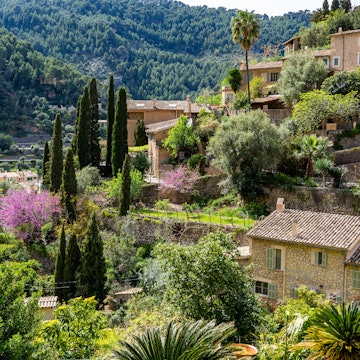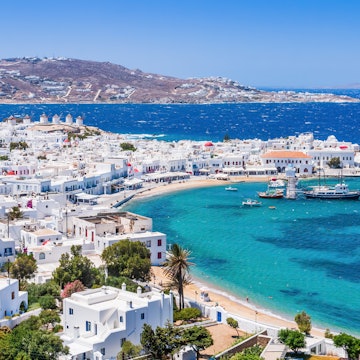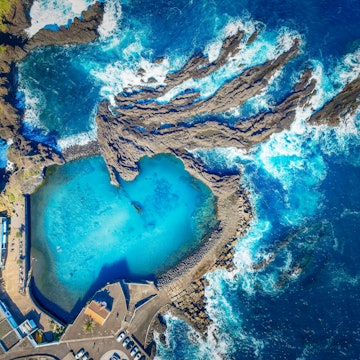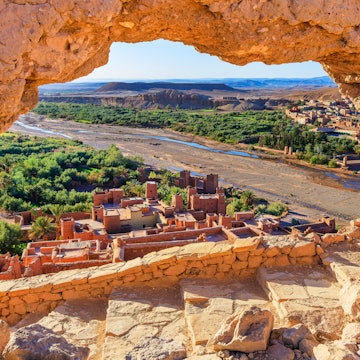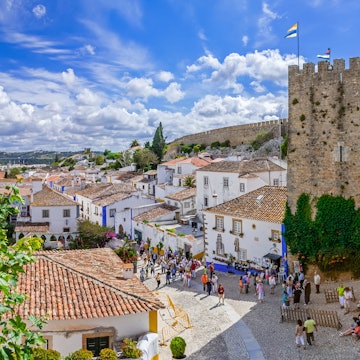
Spain itineraries: 6 great routes that cover the whole country

Feb 12, 2026 • 15 min read

Bay of Portlligat in Cadaqués, Spain. Cole Wilson for Lonely Planet
It’s no exaggeration to say that Spain has it all.
A rocky northern coast with some of the world’s best food. White-sand beaches and white-washed villages in the sunny south. Moorish castles and Modernista architecture. No matter where you go in Spain, it will be epic.
These six itineraries cover the whole country and show off the best it has to offer. We’ve kept our suggestions to trips of one to two weeks long – though we encourage you to add on stops or combine itineraries to build the Spanish trip of your dreams.


1. See Spain’s seductive cities
7-day itinerary
Distance: 780km (485 miles)
With a week, you’ll want to explore Spain’s three major cities, which are linked by high-speed train (an adventure in itself). This culture-packed journey combines the thrills of Mediterranean-hugging Barcelona and Valencia with the Spanish capital’s art-world riches and enchanting Toledo. Expect terrific food at every turn.
Barcelona: 2 days
Start with the irresistible Catalan capital, Barcelona. Explore the old medieval center, drink in the jewels of Modernisme, laze on the Mediterranean beaches and roam around the outstanding galleries – until the tapas bars, cocktail spots and Michelin-star menus pull you away.
Next stop: Take a high-speed train from Barcelona to Valencia (around 3 hours).
Detour: Mystical, unmissable Montserrat is an easy day trip from Barcelona (add 1 day).
Valencia: 2 days
Sunny, cycling-loving Valencia delights with its magnificent markets, golden beaches, lively green spaces, dynamic dining (there’s much more than paella here), impressive eco credentials and local-vibe neighborhoods like Russafa and El Carmen.
Next stop: Take a train from Valencia to Madrid (around 2 hours).
Extension: Catch the ferry from Valencia or Dénia for a few days in beachy Mallorca or Ibiza (add 2–3 days). Or stop over in Cuenca en route to Madrid (add 1 day).
Madrid: 2 days
While you could spend weeks in Madrid and only scratch the surface, a couple of days in the capital provides a good intro. Cycle around Retiro park, wander the renowned galleries and dive into the tapas scene and lively markets. Time permitting, take a day trip to the stately royal monastery-palace at El Escorial.
Next stop: Take a train or bus from Madrid to Toledo (around 1 hour).
Detour: Visit one of southern Castilla y León's historical cities, Segovia or Ávila (add 1 day).
Toledo: 1 day
Spending a night in Toledo will introduce you to this former capital, one of Spain’s most mesmerizing cities. Stroll around the UNESCO-listed old town, where traces of three religions (Christian, Jewish and Muslim) famously mingle. Learn about El Greco. And dig into Castilla-La Mancha’s culinary specialties.
Extension: Go wine-tasting in Valdepeñas or bird-watching in the Parque Nacional Tablas de Daimiel (1 day).


2. Embark on an Andalucían adventure
12- to 14-day itinerary
Distance: 770km (478 miles)
This thrilling spin takes in Andalucía’s greatest charms, weaving between can’t-miss cities and beautiful villages, with plenty of opportunities to get out into wild natural spaces. Soak up the changing landscapes as you travel from the Mediterranean coast to the heights of the Sierra Nevada, and from rolling olive groves to the thundering Atlantic.
Málaga: 1–2 days
Dive straight into sunny Málaga with a wander around the historic center, explore the Soho street-art scene and galleries such as the Museo Picasso, and enjoy a seafood lunch by the Mediterranean. Later on, enjoy the city’s famous tapas and nightlife scenes.
Next stop: Drive from Málaga to Las Alpujarras (2 hours and 15 minutes).
Detour: Take a road trip around La Axarquía’s whitewashed mountain villages (add 1 day).
Las Alpujarras: 1–2 days
Zip northeast to the dramatic slopes of Las Alpujarras, where you can walk between ancient villages, hike up mighty Mulhacén, stay in a charming rural hotel and drink in the mountain views while sampling some of Spain's finest jamón (ham) and Granada’s on-the-up wines. If you’re here in winter, hit the Sierra Nevada’s ski slopes.
Next stop: Drive from Las Alpujarras to Granada (roughly 2 hours).
Granada: 2 days
Possibly Andalucía’s most magical city, Granada is a dream of labyrinthine streets, lively tapas bars and centuries of history. It all starts with the spectacular Alhambra. It continues in the Albayzín and Realejo quarters, on the fabulous flamenco scene, in heritage hotels and beyond.
Next stop: Drive from Granada to the pueblos blancos (roughly 3 hours).
Detour: En route to the white villages, wander around un-touristed Antequera and grab a bite to eat (add a half-day).
Pueblos Blancos: 2 days
The pueblos blancos (white villages) of Cádiz province are some of Spain’s most beautiful settlements. Explore villages like Grazalema, Zahara de la Sierra and Arcos de la Frontera (all make excellent bases), and go hiking, horse riding and more in the Parque Natural Sierra de Grazalema.
Next stop: Drive to your base in the Costa de la Luz (roughly 2.5 hours).
Extension: Popular Ronda makes a great, though larger, alternative base or day-trip destination (add 1 day).
Costa de la Luz: 2 days
Base yourself in Tarifa or Vejer (but don’t miss either) for a breath of Atlantic air on Cádiz’s wind-swept Costa de la Luz. Both towns have white-walled, Moorish-origin historic cores and ever-evolving food scenes, while gorgeous sandy-blond beaches disappear into the distance along the coast.
Next stop: Drive from your base to Cádiz (roughly 1.5 hours).
Extension: Take a day trip to Gibraltar and discover the Rock’s history (add 1 day).
Cádiz: 1–2 days
Take your time wandering through one of Europe’s oldest cities. Founded by the Phoenicians, Cádiz has enough leafy plazas, historical riches, Atlantic-washed beaches and heaving tapas bars to make you want to linger longer.
Next stop: Drive from Cádiz to Seville (1.5 hours) or take a train (roughly 2 hours).
Detour: Sherry-loving Jerez de la Frontera and Sanlúcar de Barrameda both make fascinating stopovers en route to Seville (add 1–2 days).
Seville: 2 days
Zip north to the soulful Andalucian capital of Seville. Dig into architectural delights such as the cathedral and the Real Alcázar, the busy barrios (neighborhoods), the rich art scene, the flamenco world and some of Spain’s finest tapas bars.
Extension: Easily reached by high-speed train from Seville, Córdoba is Andalucía’s other dazzling city (add 1 day).

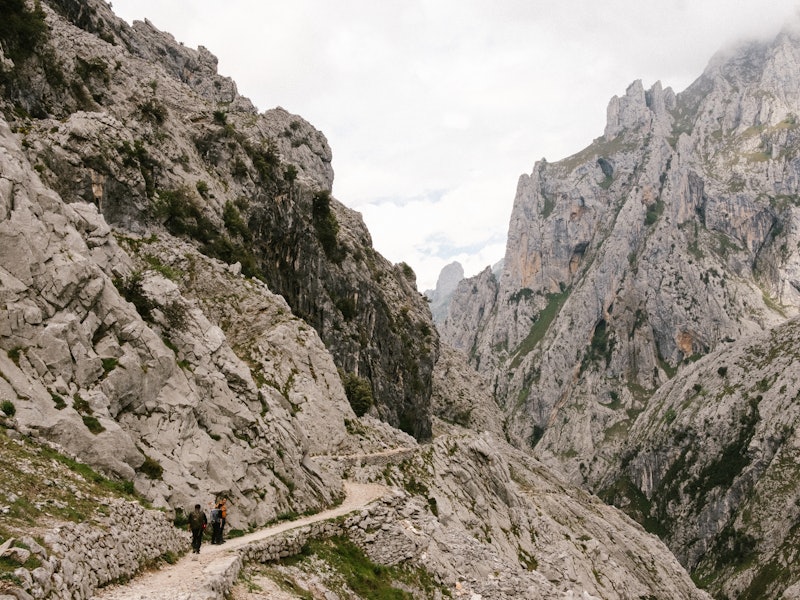
3. Explore the lush north coast
10- to 12-day itinerary
Distance: 900km (559 miles)
An entirely different world from the sun-baked Mediterranean shoreline, Spain’s lushly green, cider-sipping northern coast is one of Europe’s most spectacular. Towering sea cliffs give way to honey-gold beaches washed by Atlantic surf waves, while the cities here are lively hubs with buckets of soul and some of the country’s finest gastronomy.
Donostia/San Sebastián: 2 days
One of the world’s great culinary cities, Donostia/San Sebastián provides the perfect welcome to the north, with its cliff-edged beaches and bustling old town. Go bar-hopping among the best pintxo (Basque small plates) spots, try some surfing, savor the atmosphere on lovely Playa de la Concha and hike along the lush coastline.
Next stop: Drive from Donostia/San Sebastián to Bilbao or take a bus (roughly 1.5 hours).
Detour: Stop to learn about sobering Civil War history in Gernika (add half a day).
Bilbao: 1–2 days
Next up is thrilling Bilbao, where the awe-inspiring Museo Guggenheim is only the start of countless galleries that will command art lovers' attention. And anyone will love getting lost in the atmospheric Casco Viejo (among Spain’s great pintxo districts), walking or cycling along the riverfront, or even hitting the beach.
Next stop: Drive from Bilbao to Picos de Europa (roughly 3 hours).
Detour: See some of Europe’s finest prehistoric cave art at Altamira (3–4 hours).
Picos de Europa: 2 days
Onward to the majestic Picos de Europa, where the Cantabrian town of Potes makes a delightful base. Spain’s second-largest national park is an enthralling adventure playground, where you can go walking, kayaking or rock-climbing; visit the historic pilgrimage site of Covadonga; taste northern cheeses; and soar high on the cable car.
Next stop: Drive from your base to Oviedo (roughly 3 hours).
Detour: Drop down to the Asturian coast at lovely Ribadesella (add 1 day).
Oviedo: 1 day
Say “¡hola!” to the elegant Asturian capital of Oviedo – ideally with a cider and a plate of Picos cheeses. Then stroll around the old town, where highlights include the great Gothic cathedral and an open-air sculpture gallery.
Next stop: Drive from Oviedo to A Coruña (roughly 3 hours).
Extension: Around 75km (47 miles) southwest of Oviedo, go hiking and bear spotting in the serene Parque Natural de Somiedo (add 1 day).
A Coruña: 1 day
Atlantic-side A Coruña is a thriving city in the province of Galicia that is crammed with delectable seafood restaurants, energetic bars, excellent museums and an entrancing historic center. All this makes it a great place to linger off the beaten track.
Next stop: Drive along the Costa da Morte, stopping wherever you desire.
Detour: Take a side trip to spectacular Cabo Ortegal and the Punta da Estaca de Bares, Spain’s northernmost point (add half a day).
Costa da Morte: 1–2 days
Galicia’s mist-shrouded Costa da Morte delivers cascading sea cliffs, wind-battered lighthouses, Atlantic beaches and wonderful rural hotels, taking in magical Cabo Fisterra and the final extension of the famous Camino de Santiago.
Next stop: Drive to Santiago de Compostela, the end of the Camino.
Detour: Head to the Rías Baixas to discover albariño wines, or sail out to the dreamy Illas Cíes (add 1 day).
Santiago de Compostela: 2 days
The entrancing Galician capital of Santiago de Compostela is one of Spain’s most beautiful cities, with one of the world’s most celebrated cathedrals at its heart. Exploring the cobbled squares, feasting on fresh seafood and catching folk-music sessions makes for the perfect final chapter.
Extension: Extend the delights on the Ribeira Sacra, with its wineries, monasteries and walking trails (add 1–2 days).


4. Follow the Catalan coast, then ascend into the Pyrenees
9-day itinerary
Distance: 800km (497 miles)
There’s a whole lot more to Catalonia than Barcelona. This adventure-filled itinerary takes in the region’s most exquisite coastline, with its weighty art heritage and pine-fringed coves – before plunging into the vast natural expanses of the Catalan Pyrenees, where endless adventure and peaceful medieval villages await.
Girona: 2 days
In Girona – which has its own handy airport – echoes of the past loom around every corner, from the 14th-century cathedral to the fortified walls and the many bridges crisscrossing the Riu Onyar. For good measure, you can also enjoy excellent museums, an impressive historic center and some of Spain’s top restaurants.
Next stop: Drive from Girona to Cadaqués (roughly 1.5 hours).
Detour: Discover boutique hotels, buzzing restaurants and twinkling coves in hillside Begur (add 1–2 days).
Cadaqués: 2 days
It’s time for the pine-dusted Costa Brava, one of Spain’s – and the world’s – most celebrated shorelines. And Cadaqués is perhaps the prettiest of all its towns. Roam around the whitewashed streets here, take a dip in the Mediterranean, hike around Cap de Creus and learn all about Dalí's legacy at his former house.
Next stop: Drive from Cadaqués to Parc Nacional d’Aigüestortes i Estany de Sant Maurici (roughly 5 hours).
Detour: Don't miss the fantastical Teatre-Museu Dalí in Figueres (3 hours).
Parc Nacional d’Aigüestortes i Estany de Sant Maurici: 2 days
Worth the long journey (consider stopping off at La Garrotxa along the way), Catalonia’s sole national park is a wonderland of glinting lakes, distant peaks and tempting walking trails. Lively Espot makes an ideal base. It’s possible to hike across the park to Boí-Taüll in one day.
Next stop: Drive from your base to Vall de Boí (roughly 2 hours).
Extension: Find more active fun in the remote Val d'Aran (add 1 day).
Vall de Boí: 1 day
One of Catalonia’s most delightful corners, the Vall de Boí hugs the western edge of the national park. Distinct Catalan Romanesque churches anchor the medieval villages of Taüll, Boí and Erill la Vall, where you can go hiking, winter skiing and see summer festivals.
Next stop: Drive from your base to Barcelona (roughly 4 hours).
Extension: Continue your Pyrenees adventures in Aragón with Benasque or the Parque Nacional de Ordesa y Monte Perdido (add 1–2 days).
Barcelona: 2 days
Travel back to Barcelona, where you can see original Vall de Boí church frescoes hanging in the Museu Nacional d’Art de Catalunya, have a dip in the sea at a city beach, eat Catalan-style arròs (rice) or go tapas-hopping around the Ciutat Vella.
Extension: Roman Tarragona makes an excellent side trip from Barcelona (add 1 day).

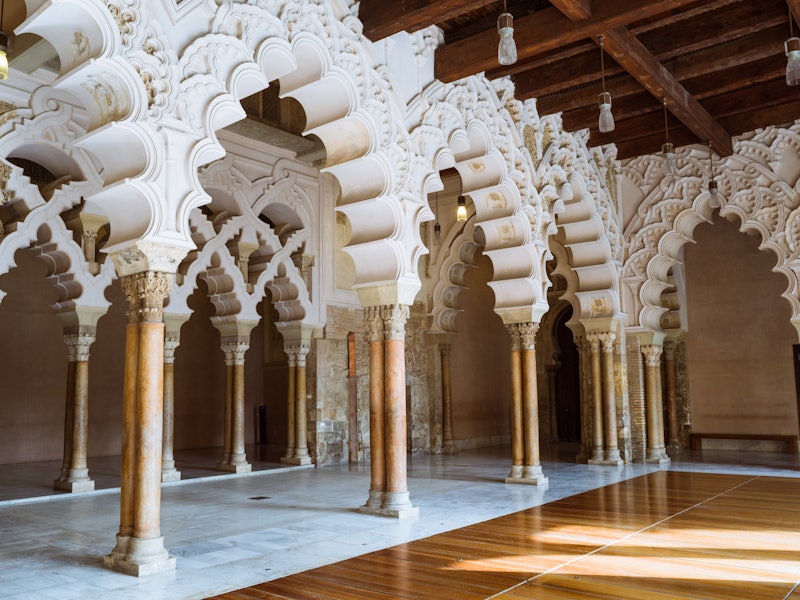
5. Cruise through Castilla y León and Aragón
10-day itinerary
Distance: 990km (615 miles)
Away from the popular coasts, inland Spain serves up an evocative blend of dynamic cities, impossibly pretty villages and wide-open plains, dotted with crumbling castles, elegant bodegas and spirited restaurants serving meaty specialties. Take a hop around the culturally extraordinary cities of Castilla y León, then escape into the majestic Aragonese Pyrenees for hiking, cycling and adventure sports.
Segovia: 1 day
A quick hop from Madrid, the UNESCO-listed city of Segovia instantly immerses you in that only-in-Castilla feel, thanks to its astonishing Roman aqueduct, myth-laced origins, Gothic cathedral and an alcázar (fortress) so magical it inspired Walt Disney’s Sleeping Beauty.
Next stop: Drive from Segovia to Ávila (50 minutes).
Extension: Go wine-tasting in Ribera del Duero, one of Spain’s most respected wine regions (add 1 day).
Ávila: 1 day
With some of Spain's best-preserved medieval walls, Ávila feels plucked from a film set, especially when lit up at night. Learn about the pilgrims who have flocked to its cathedral for centuries, try meaty Castilian delicacies and explore the old town.
Next stop: Drive from Ávila to Salamanca (1 hour).
Detour: Seek serenity among the walking paths of the Sierra de Gredos, an ever-more-popular nature escape easily accessible from Madrid (add 1 day).
Salamanca: 1 day
Spain’s most beautiful Plaza Mayor is found in the lively university hub of Salamanca. Here, you can admire Renaissance and 16th-century plateresque architecture, soak up the academic atmosphere and stay out late into the night.
Next stop: Drive from Salamanca to Astorga and León (roughly 2 hours).
Detour: Head out hiking in the Parque Natural Arribes del Duero or stop to explore Zamora’s historical riches on the journey north (add 1 day).
Astorga and León: 2 days
Energetic León and the old Roman settlement of Astorga are your next history-loaded stops, both attractive bases. León has one of Spain’s most impressive cathedrals, and both cities enjoy a rich Camino de Santiago heritage. (You can even join the pilgrims for a day or more of hiking.) Drink it all in – but don’t sleep on the terrific tapas bars here.
Next stop: Drive from Astorga and León to Burgos (roughly 2.5 hours).
Burgos: 1 day
Another jaw-droppingly beautiful cathedral? Absolutely. The UNESCO-protected Gothic cathedral of Burgos is one of Spain’s most inspired, while the city’s strong regional food scene rewards those who linger.
Next stop: Drive from Burgos to Zaragoza (roughly 3.5 hours).
Detour: Go bird-watching and walking in the Desfiladero de La Yecla or the Parque Natural Cañón del Río Lobos (add 1 day).
Zaragoza: 2 days
Cross into Aragón, whose capital Zaragoza is an underrated delight, with such treasures as the works of Goya, a revered riverside basilica, the Moorish Aljafería and one of Spain’s greatest tapas scenes.
Next stop: Drive from Zaragoza to Parque Nacional de Ordesa y Monte Perdido (roughly 2 hours).
Detour: Detour slightly south to the beautiful pink-hued medieval village of Albarracín, perhaps with a side trip to Mudéjar-style Teruel (add 1 day).
Parque Nacional de Ordesa y Monte Perdido: 2 days
There’s no shortage of outdoor thrills in Ordesa y Monte Perdido, one of Spain’s oldest national parks and top hiking destinations. Wonderful walking trails, snow-dusted peaks, majestic mountain panoramas and shimmering lakes await in this spectacular pocket of Aragón's Pyrenees, where Torla and Aínsa make atmospheric access towns.


6. From Andalucía to Extremadura
8-day itinerary
Distance: 440km (273 miles)
Combine the urban energy of Seville with exploring well off the beaten track in alluring Extremadura, a lesser-known corner of Spain on the border with Portugal. Beyond Seville’s Moorish-era monuments and Andalucian thrills, Extremadura promises old cities, outstanding Roman ruins, a hyper-local food scene and wide-open natural spaces.
Seville: 2 days
Get started in lively Seville, where fiery flamenco, riverside strolls, outstanding monuments (such as the Giralda, the Real Alcázar and Las Setas) and some of Spain’s tastiest tapas bars invite leisurely explorations.
Next stop: Take a bus from Seville to Mérida (roughly 2.5 hours) or drive (2 hours).
Extension: Add on the sherry-making town of Jerez de la Frontera, or try your luck looking for lynxes in the Parque Nacional de Doñana (add 1 day; accessible by car).
Mérida: 2 days
Head north (perhaps via pretty Zafra or jamón hub Monesterio) to Mérida, home to some of Spain’s most magnificent Roman ruins. The inspiring, still-in-use theater provides a sense of how this was a major Roman city 2000 years ago. And there’s even more to see in nearby Medellín.
Next stop: Take two buses from Mérida to Guadalupe, switching in Cáceres, (3–5 hours) or drive (roughly 1.5 hours).
Detour: Pop into underrated Badajoz near the Portuguese border (add 1 day, accessible by car).
Guadalupe: 1 day
Perfectly doable as a day trip from Mérida or Trujillo (or as a stop between the two), the UNESCO-listed monastery of Guadalupe ranks among Spain’s most sacred places and major pilgrimage destinations. Travel into Extremadura’s mountainous eastern reaches to explore this small, charming town – and catch a glimpse of the famous Virgen de Guadalupe.
Next stop: Take a bus from Guadalupe to Trujillo (roughly 2 hours) or drive (roughly 1.5 hours).
Trujillo: 1 day
Explore the architectural riches and down-to-earth food world of Trujillo, where grand palaces, churches and plazas reveal the town’s major role in the colonization of the Americas. In more recent history, fans of the hit shows House of the Dragon and Game of Thrones might recognize its historic streets.
Next stop: Take a bus from Trujillo to Cáceres (roughly 1 hours) or drive (45 minutes).
Detour: Extremadura's remote northeast valleys, including La Vera, lie within easy reach of Trujillo (add 1 day; accessible by car).
Cáceres: 2 days
Arguably Extremadura’s most beautiful city, Cáceres reveals one of Spain’s most magical old towns, along with a thriving regional dining scene, an impressive art collection and a few more cinematic surprises. From here, it’s a quick train hop back to transport hub Madrid.
Extension: Enjoy some of the finest bird-watching in the country in the Parque Nacional de Monfragüe (add 1 day; accessible by car).
Take your Spain trip with Lonely Planet Journeys
Time to book that trip to Spain
Lonely Planet Journeys takes you there with fully customizable trips to top destinations–all crafted by our local experts.
















